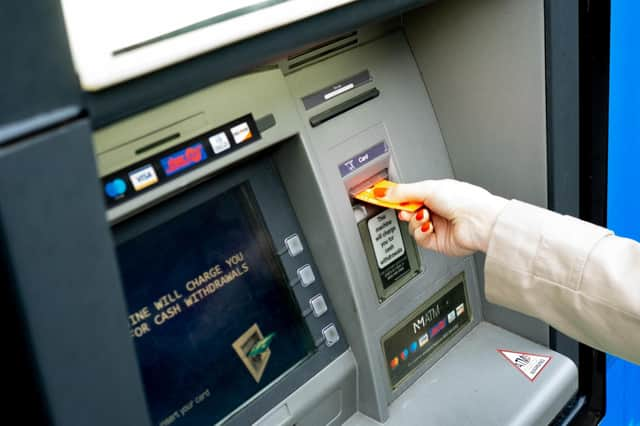Cash machine withdrawals plummeted during lockdown


Across Scotland, cash machine withdrawals between April and September fell by 52 per cent compared to the same time last year, with consumers taking out out £2.5bn less than they did twelve months earlier, according to data from LINK, the UK’s main cash machine network. The amount being withdrawn now is still over a third less than the same period in 2019.
In some areas of Scotland - including central Glasgow and Orkney - the amount taken out of cash machines dropped by over 70 per cent, while the overall Scottish figure is lower than any other UK area outside of the south west of England.
Advertisement
Hide AdAdvertisement
Hide AdThe data - which looked at withdrawals in parliamentary constituencies - shows that there was often less of a reduction in cash machine usage in more deprived areas of Scotland, where many people are more reliant on cash.
Glasgow North East, Airdrie and Shotts and Glasgow East saw the least drop in cash machine withdrawals - at 34.2 per cent, 36 per cent and 37.7 per cent respectively.
The news comes a day after a report from Which? showed that many people struggled to find shops where they could spend cash during lockdown, raising fears of being unable to cope or losing independence if further lockdown restrictions made shopping and paying with cash more of a challenge.
Nick Quin, head of financial inclusion at LINK, said: “It is interesting to see stark differences in cash withdrawals across the country, most notably within Glasgow, but even from one town to the next.
“Some of this down to the fact that people aren’t visiting busy city centres or that the local ATM may have temporarily closed. More importantly, we can see that some communities are far more reliant on cash and quite often cards and digital payments don’t work for everyone.”
Citizens Advice Scotland financial health spokesperson Sarah-Jayne Dunn said: “Helping people access cash is vital as many families rely on it as a means to control, budget and monitor their spending. With more and more people finding their income reduced or restricted, the need to account for every penny is becoming more apparent.
She added: “Put simply, the need for cash has not gone away and we know from our own data that those on lower incomes are at a greater risk of financial vulnerability and exclusion, yet this group has a higher likelihood to prefer cash over card and online payments.
“We must do everything we can to ensure we do not become a cashless society as this will exclude many people who rely on physical money.”
Advertisement
Hide AdAdvertisement
Hide AdIn the early stages of the pandemic, around 600 ATMs closed across Scotland. Many of these were located in premises that closed due to government restrictions - such as those in shops, airports, garden centres, pubs - or were closed for social distancing purposes at locations including train stations and supermarkets. By the end of September around 50 per cent of these had reopened.